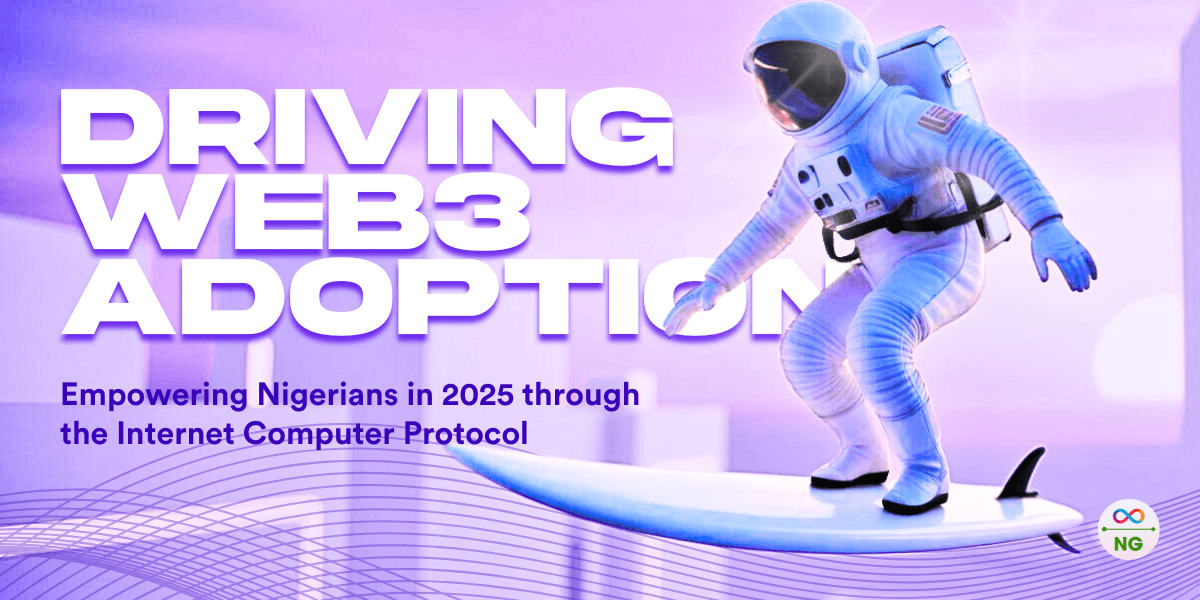Driving Web3 Adoption to Empower Nigerians in 2025 through the Internet Computer Protocol
January 28, 2025

Discussions around Web3 have elicited varied reactions across Nigeria. While many view it as a groundbreaking innovation with the potential to transform economies, others—including some government officials—have voiced apprehensions about its potential to facilitate illegal activities or destabilise the financial system.
Amid these concerns, the Internet Computer Protocol (ICP) has emerged as a pivotal force, demonstrating how Web3 can drive economic growth and foster innovation across Africa.
The Misconception Behind the Web3 Ecosystem
One prevailing stereotype about Web3 in Nigeria is that it is synonymous with cryptocurrency scams and illegal transactions. This perspective has been fueled by isolated incidents of fraudulent schemes masquerading as legitimate crypto projects. For example, media reports have highlighted cases where unsuspecting Nigerians fell victim to Ponzi schemes disguised as blockchain ventures. These stories, while cautionary, do not define the broader potential of Web3.
Another concern often raised is the potential loss of regulatory control. Some officials worry that Web3 technologies, with their decentralised nature, could bypass traditional financial oversight mechanisms, making it harder to combat money laundering and tax evasion. However, this is a misunderstanding of how Web3 functions.
The Reality: Web3 as a Catalyst for Growth
Far from being a vehicle for crime, Web3 is a revolutionary technology designed to empower individuals and promote transparency. At its core, Web3 enables decentralisation, meaning control is distributed across networks rather than centralised entities. This transparency can make it easier to track transactions and reduce corruption—a challenge Nigeria has long grappled with.
Web3 also holds immense potential for the common Nigerian. Imagine a young entrepreneur in Kano or a trader in Aba gaining direct access to global markets without intermediaries. Through blockchain-based smart contracts, they could conduct secure and trustworthy transactions, even with partners halfway across the world. Additionally, decentralized finance (DeFi) platforms offer alternatives to traditional banking, providing microloans and savings options to the unbanked population.
Economic Prospects of Web3 in 2025
As we step into 2025, the economic potential of Web3 in Nigeria is becoming more evident. The technology offers opportunities to create jobs, attract foreign investment, and stimulate innovation. With a youth population eager to embrace digital skills, Nigeria is well-positioned to become a leader in the African tech landscape.
Several young Nigerians have already made significant strides in this space. Take, for instance, the likes of Iyinoluwa Aboyeji, co-founder of Flutterwave, and Odunayo Eweniyi of PiggyVest, whose work in fintech has set the stage for broader technological adoption. These trailblazers prove that Nigerians possess the intelligence and creativity to harness Web3 for good.
The Role of ICP in Driving the Agenda
One key player in this ecosystem is the Internet Computer Protocol (ICP), which has been instrumental in enabling decentralized applications and services. In 2024, ICP focused on expanding its reach in Africa, supporting initiatives that empowered developers and startups. Through grants, developer bootcamps, and partnerships, ICP demonstrated its commitment to fostering innovation on the continent.
Looking ahead to 2025, ICP aims to deepen its impact by introducing technologies like decentralized artificial intelligence and the self-writing internet. These innovations promise to make digital platforms more accessible, cost-effective, and efficient for businesses and individuals alike. By reducing barriers to entry, ICP is laying the groundwork for a more inclusive digital economy.
A Call to Embrace Web3
Dear reader, Web3 is not the adversary it is sometimes made out to be. Instead, it is a tool—one that, if properly understood and implemented, could transform Nigeria’s economy and uplift millions. By addressing misconceptions and fostering collaboration between stakeholders, including the government, private sector, and tech community, we can harness the full potential of this technology.
Let’s move beyond the fears and embrace the possibilities. Nigeria’s youth are ready, the tools are available, and the future is within reach. Together, with innovations from platforms like ICP and the entrepreneurial spirit of Nigerians, 2025 could be the year we redefine our digital and economic landscape.